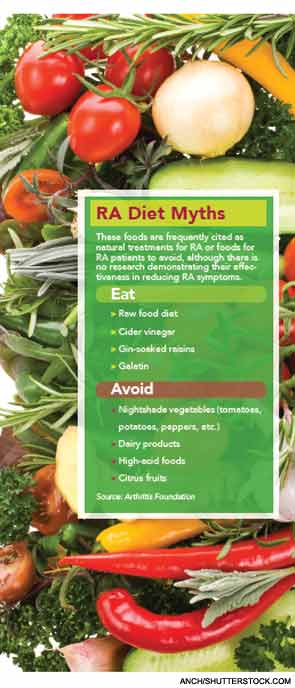

During a checkup, a rheumatoid arthritis (RA) patient asks about the best diet to follow to help control RA symptoms—how do you respond? Although there are no clear-cut answers on what diet is most helpful, it is important to consider food choices, along with medication, exercise, and other factors, as part of each patient’s treatment plan.
With the voluminous diet choices and trends out there—Mediterranean, gluten-free, vegetarian, dairy-free, and plenty of other so-called nutritional “cure-alls” your patients can easily find online—it’s hard to advise RA patients on the best dietary choices.
Still, it’s a crucial topic to address as there are some patients who would prefer to try a natural approach before they take medications, says Scott Zashin, MD, a rheumatologist practicing in Dallas. Or, they want to follow a healthy diet that can help their RA along with the use of medications.
The idea of controlling arthritis through changes in diet appeals to many patients, says Richard S. Panush, MD, professor of medicine in the division of rheumatology if the department of medicine at Keck School of Medicine at the University of Southern California in Los Angeles. “The notion that today’s symptoms reflect what one ate yesterday—and that symptoms are therefore simple to control by eating certain foods and not others—is very seductive,” wrote Dr. Panush and co-authors in a recent publication on complementary and alternative medicine for RA.1
Discussing diet is also important because many patients with RA may have trouble buying or preparing meals, which could make them even more vulnerable to additional dietary restrictions, says Geir Smedslund, PhD, senior researcher at the National Resource Centre for Rehabilitation in Rheumatology in Oslo, Norway.
Despite evidence (or lack thereof) for an ideal RA diet, there are some drawbacks with using diet as a way to help RA symptoms. First, there’s limited scientific proof regarding the effectiveness of a dietary approach aimed to help RA, says Dr. Panush. Another drawback of a dietary approach is that it can be hard to follow in the long term, says Dr. Smedslund. This is something that Dr. Smedslund and fellow researchers pointed out in their 2010 review article on diet and RA, where they observed high dropout rates related to specific dietary trends.2
Even though a number of patients seem to have a genuine interest in improving their diet, that doesn’t mean that they’ll stick with it. “Rheumatoid patients are not necessarily more motivated than others to follow a certain diet because the treatments we have for them are so good,” says Dr. Zashin.


